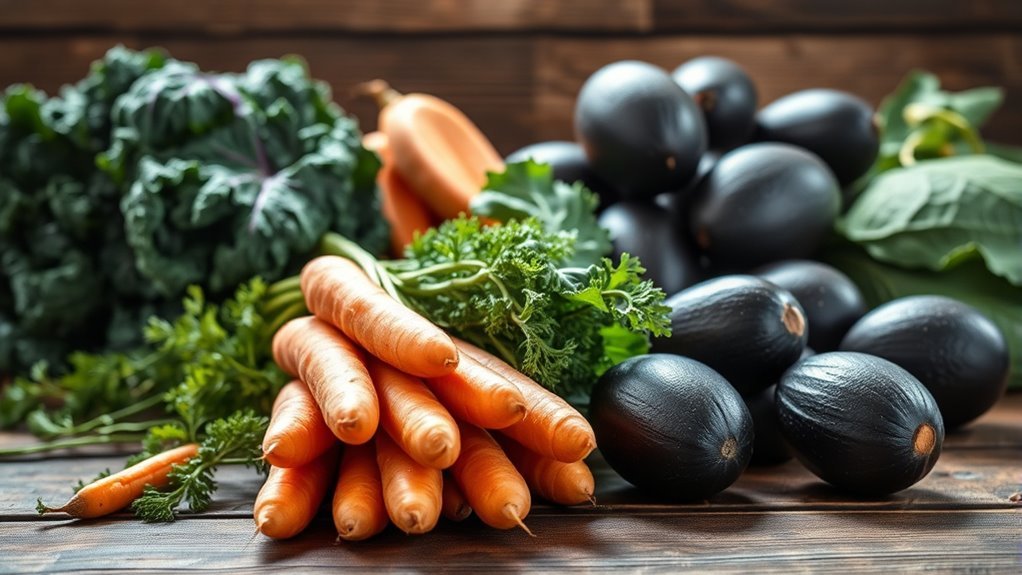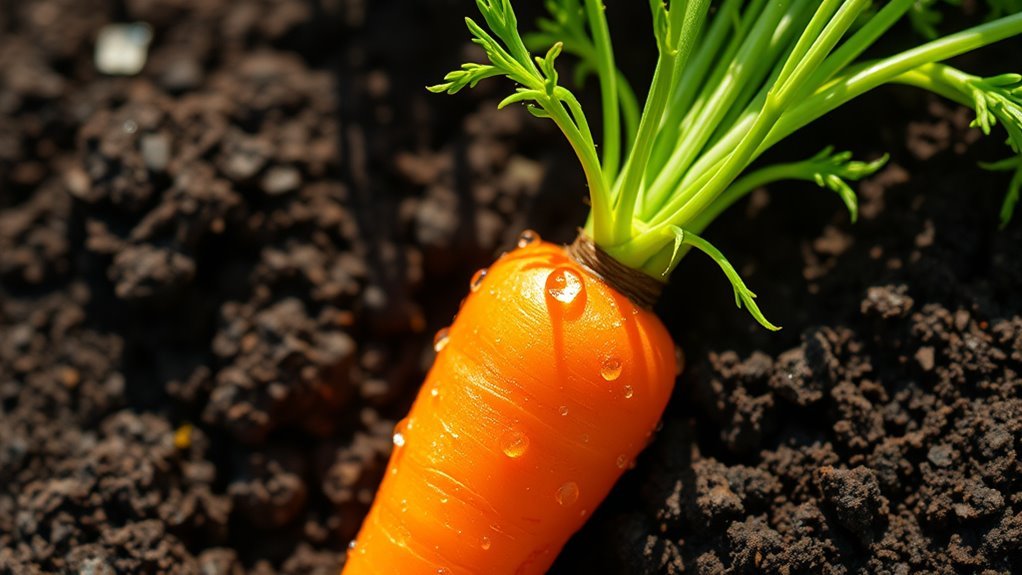Yes, you can have carrots on keto, but moderation is key due to their moderate carb content. A medium carrot has about 6 grams of carbs, which can fit into your daily allowance if you manage portion sizes. Pairing them with high-fat dips can create balanced meals. Consider the glycemic index, as baby carrots may have a higher response. If you want to explore more options and tips for including carrots in your meal plan, there’s plenty to discover.
Understanding the Keto Diet and Its Principles

The ketogenic diet, often referred to simply as “keto,” is a high-fat, low-carbohydrate eating plan designed to shift your body into a state of ketosis. Understanding the keto basics is essential for anyone looking to embrace this lifestyle. At its core, the diet principles focus on drastically reducing carbohydrate intake while increasing fat consumption, which helps your body burn fat for fuel instead of glucose. This shift can lead to improved energy levels, mental clarity, and potential weight loss. While it offers freedom from traditional dietary restrictions, it’s important to monitor your macros to maintain ketosis. Ultimately, keto empowers you to make conscious choices about your food, promoting a deeper understanding of nutrition and its impact on your well-being.
Nutritional Profile of Carrots

When considering carrots on a keto diet, it’s important to look at their nutritional profile. Carrots contain a moderate amount of carbohydrates and are also packed with essential vitamins and minerals. Understanding this balance will help you make informed choices about including them in your meal plan.
Carbohydrate Content Analysis
While many people enjoy the crunch and sweetness of carrots, it’s important to examine their carbohydrate content, especially if you’re following a ketogenic diet. Different carrot varieties can have varying carb counts, so knowing your serving sizes is essential. Here’s a quick breakdown:
- Raw Carrots: About 9 grams of carbs per 100 grams.
- Baby Carrots: Slightly lower, around 8 grams per 100 grams.
- Cooked Carrots: They can contain about 7 grams of carbs per 100 grams due to concentration during cooking.
While these amounts might fit into some low-carb diets, they could be challenging for strict keto adherence. Always consider how carrots fit into your overall daily carb intake to maintain your desired freedom in food choices!
Vitamins and Minerals Overview
Carrots are not just crunchy and sweet; they’re also packed with essential vitamins and minerals that can benefit your health. These vibrant veggies are an excellent source of vitamin A, which supports eye health and immune function. You’ll also find vitamin K, vital for blood clotting, and several B vitamins that aid energy metabolism. On the mineral side, carrots provide potassium, which helps regulate blood pressure, and manganese, important for bone health. While they may be higher in carbs compared to other keto-friendly vegetables, their vitamin benefits and mineral sources make them a valuable addition to a balanced diet. So, if you’re craving a nutritious snack, don’t hesitate to enjoy carrots in moderation!
Carbohydrate Count in Carrots

Many people may be surprised to learn that a medium-sized carrot contains about 6 grams of carbohydrates. When you’re carb counting on a keto diet, it’s important to be aware of the carb content in different carrot varieties. Here’s a quick breakdown:
- Medium Carrot: Approx. 6g carbs
- Baby Carrots: About 4-5g carbs per serving
- Purple Carrots: Roughly 7g carbs
While carrots can add color and nutrients, their carb count can add up. If you’re aiming for a low-carb lifestyle, moderation is key. You can still enjoy carrots occasionally, but be mindful of how they fit into your daily carb allowance. Balancing your choices helps maintain freedom in your diet while sticking to your keto goals.
Glycemic Index of Carrots
Understanding the glycemic index (GI) of carrots can help you make informed choices on a keto diet. The GI measures how quickly a food affects your blood sugar levels. Carrots generally have a moderate GI, ranging from 39 to 92, depending on the variety. For instance, baby carrots may elicit a higher glycemic response than mature carrots. However, when consumed in moderation, they can fit into your keto meal plan without causing significant spikes in blood sugar. It’s crucial to evaluate portion sizes and the overall context of your diet. Incorporating different carrot varieties can add flavor and nutritional diversity while keeping your carbohydrate intake in check. Just remember to listen to your body and adjust accordingly.
Comparing Carrots to Other Vegetables
While carrots can be a tasty addition to a keto diet, it’s important to compare them with other low-carb vegetables to guarantee you’re making the best choices for your nutritional needs. Here are some vegetable comparisons to evaluate:
- Zucchini: Low in carbs and high in water content, it’s perfect for noodle alternatives.
- Spinach: Packed with nutrients and very low in carbs, making it an excellent leafy option.
- Cauliflower: A versatile veggie, often used as a rice or mash substitute, and low in carbs.
When exploring carrot varieties, remember that although they offer sweetness and crunch, their carb content is higher than these alternatives. Balancing your choices can help you stay within your keto goals while still enjoying a variety of flavors.
Incorporating Carrots Into Your Keto Meal Plan
When incorporating carrots into your keto meal plan, it’s essential to understand their nutritional value and how they fit within your daily carb limits. You can enjoy carrots in moderation by using portion control strategies to keep your intake in check. Additionally, exploring creative recipe ideas can help you enjoy carrots without compromising your keto goals.
Nutritional Value Overview
Carrots can be a nutritious addition to your keto meal plan, provided you’re mindful of portion sizes. While some keto misconceptions suggest you should avoid carrots due to their carbs, these vibrant veggies offer several carrot benefits that shouldn’t be overlooked:
- Rich in Nutrients: Carrots are packed with vitamins A, C, and K, which support overall health.
- Antioxidant Properties: They contain beta-carotene, which can help combat oxidative stress and inflammation.
- Low Glycemic Index: When eaten in moderation, carrots have a low glycemic index, making them less likely to spike blood sugar.
Incorporating carrots mindfully allows you to enjoy their health benefits while staying aligned with your keto goals. Just remember to balance your intake!
Portion Control Strategies
To successfully incorporate carrots into your keto meal plan, it is essential to focus on portion control. Carrots can fit into your diet, but their carb content means you need to be mindful of portion sizes. Consider limiting your intake to a small serving—about half a cup of raw carrots—to maintain your carbohydrate goals. Practicing mindful eating will help you enjoy the taste and crunch of carrots without overindulging. Pair them with high-fat dips like guacamole or cream cheese to balance your meal. Remember, it’s all about moderation; you can savor the benefits of carrots while still staying true to your keto lifestyle. By being aware of your portions, you can enjoy your meals without feeling restricted.
Creative Recipe Ideas
Although some may think carrots are off-limits on a keto diet, there are plenty of creative ways to incorporate them without exceeding your carb limits. Here are three delicious options:
- Carrot Snacks: Slice raw carrots and serve them with a keto-friendly dip like guacamole or ranch.
- Roasted Carrots: Toss carrots in olive oil, salt, and your favorite herbs, then roast until tender for a sweet, caramelized treat.
- Carrot Soups: Blend cooked carrots with broth and spices for a comforting, low-carb soup that warms your soul.
You can also experiment with carrot salads, stir-fried carrots, carrot chips, or even carrot smoothies. By using these ideas, you can enjoy the sweetness of carrots while staying on track with your keto goals!
Tips for Balancing Carbs on Keto
How can you effectively balance your carb intake while following a keto diet? One approach is carb cycling, where you alternate between low-carb days and higher-carb days. This strategy can help you maintain energy levels and prevent metabolic slowdown. Meal prepping is another essential tool; by planning your meals, you can control your carb intake more easily and avoid impulsive eating. Focus on low-carb vegetables and healthy fats to stay within your carb limits while still enjoying variety. Additionally, tracking your macros with apps can provide insights into your intake, making it easier to adjust as needed. Remember, it’s about finding a balance that works for you while enjoying the freedom this lifestyle can offer.
Alternatives to Carrots on a Keto Diet
While balancing carb intake is important on a keto diet, you may find yourself looking for alternatives to certain higher-carb vegetables like carrots. Thankfully, there are plenty of keto-friendly vegetables that can keep your meals exciting without sacrificing your carb limit. Here are some low carb alternatives to take into account:
- Zucchini – Versatile and can be spiralized or sautéed for a satisfying side.
- Cauliflower – Great for making rice or mash, adding a creamy texture to your meals.
- Broccoli – Packed with nutrients and perfect for roasting or steaming.
These veggie substitutions not only fit into your meal prep ideas but also help maintain your keto lifestyle while enjoying delicious flavors.
Frequently Asked Questions About Carrots on Keto
1. Can I eat carrots on a ketogenic diet?
Yes, you can eat carrots on a ketogenic diet, but it’s essential to monitor your portion sizes. Carrots contain more carbohydrates than many other low-carb vegetables, so while they can be included in moderation, it’s crucial to ensure they fit within your daily carb limit. A typical medium carrot has about 6 grams of carbohydrates, which can add up quickly if you’re not careful.
2. What is the carbohydrate content of carrots?
Carrots are relatively higher in carbohydrates compared to other non-starchy vegetables. A medium carrot (approximately 61 grams) contains about 6 grams of total carbohydrates, including about 2 grams of fiber. The net carbs, which are the carbs that impact blood sugar, come to around 4 grams. This means that while carrots can be enjoyed on a keto diet, they should be consumed in limited quantities.
3. How can I include carrots in my keto meals?
You can include carrots in your keto meals by using them as a crunchy snack or adding them to salads. Consider pairing raw carrot sticks with a high-fat dip, like guacamole or a keto-friendly ranch dressing. You can also use shredded carrots in stir-fries or as a base for a low-carb slaw. Just be mindful of the portion size to keep your carb intake in check.
4. Are there lower-carb alternatives to carrots on keto?
Yes, there are several lower-carb alternatives to carrots that are more suitable for a strict ketogenic diet. Some great options include celery, cucumbers, bell peppers, and leafy greens like spinach and kale. These vegetables have significantly fewer carbs and can be enjoyed more liberally while adhering to a keto lifestyle.
5. What are the health benefits of eating carrots, even on keto?
Carrots are nutritious and provide several health benefits, even if consumed in moderation on a keto diet. They are rich in beta-carotene, which the body converts into vitamin A, essential for eye health and immune function. Carrots also contain antioxidants and various vitamins and minerals, contributing to overall health. Including small amounts of carrots can add variety and essential nutrients to your diet.
References
- https://www.healthline.com/nutrition/vegetables-on-keto#carrots
- https://www.medicalnewstoday.com/articles/325507
- https://www.ncbi.nlm.nih.gov/pmc/articles/PMC7074004/
- https://www.webmd.com/diet/obesity/what-is-the-keto-diet#1
- https://www.dietdoctor.com/low-carb/vegetables
- https://www.verywellfit.com/keto-diet-and-vegetables-5190441
- https://www.eatright.org/health/lifestyle/culture-and-traditions/understanding-the-ketogenic-diet
- https://www.cdc.gov/healthyweight/healthy_eating/vegetables.html


